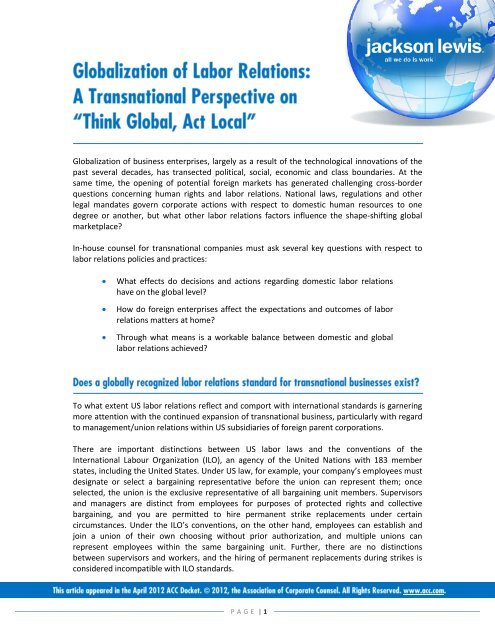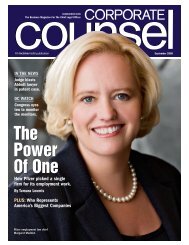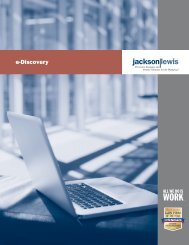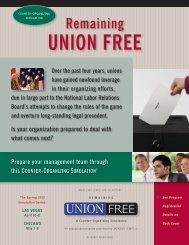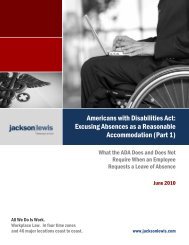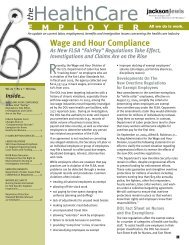Think Global, Act Local - Jackson Lewis
Think Global, Act Local - Jackson Lewis
Think Global, Act Local - Jackson Lewis
Create successful ePaper yourself
Turn your PDF publications into a flip-book with our unique Google optimized e-Paper software.
THINK GLOBAL, ACT LOCAL<strong>Jackson</strong> <strong>Lewis</strong> LLP<strong>Global</strong>ization of business enterprises, largely as a result of the technological innovations of thepast several decades, has transected political, social, economic and class boundaries. At thesame time, the opening of potential foreign markets has generated challenging cross-borderquestions concerning human rights and labor relations. National laws, regulations and otherlegal mandates govern corporate actions with respect to domestic human resources to onedegree or another, but what other labor relations factors influence the shape-shifting globalmarketplace?In-house counsel for transnational companies must ask several key questions with respect tolabor relations policies and practices:What effects do decisions and actions regarding domestic labor relationshave on the global level?How do foreign enterprises affect the expectations and outcomes of laborrelations matters at home?Through what means is a workable balance between domestic and globallabor relations achieved?To what extent US labor relations reflect and comport with international standards is garneringmore attention with the continued expansion of transnational business, particularly with regardto management/union relations within US subsidiaries of foreign parent corporations.There are important distinctions between US labor laws and the conventions of theInternational Labour Organization (ILO), an agency of the United Nations with 183 memberstates, including the United States. Under US law, for example, your company’s employees mustdesignate or select a bargaining representative before the union can represent them; onceselected, the union is the exclusive representative of all bargaining unit members. Supervisorsand managers are distinct from employees for purposes of protected rights and collectivebargaining, and you are permitted to hire permanent strike replacements under certaincircumstances. Under the ILO’s conventions, on the other hand, employees can establish andjoin a union of their own choosing without prior authorization, and multiple unions canrepresent employees within the same bargaining unit. Further, there are no distinctionsbetween supervisors and workers, and the hiring of permanent replacements during strikes isconsidered incompatible with ILO standards.P A G E | 1
THINK GLOBAL, ACT LOCAL<strong>Jackson</strong> <strong>Lewis</strong> LLPDespite these differences, the idea that international labor standards already are part of the USlabor relations scheme is explored in depth in a recent article published by Professor SteveCharnovitz of George Washington University Law School. In the article, Professor Charnovitzargues that there already is a body of “international law accepted by the United States for thegovernance of domestic labor-management relations in the world economy.” 1 He calls it the “USInternational Labor Relations <strong>Act</strong> (ILRA)” which, in addition to the National Labor Relations <strong>Act</strong>,he explains, is part ILO rules and part labor obligations of the US government embodied invarious free trade agreements (FTAs) with other nations.As a member of the International Labor Organization, the United States and US entities,including the National Labor Relations Board, are subject to ILO oversight, even though theUnited States has not ratified the two ILO conventions concerning freedom of association andthe right to organize (C.87) and collective bargaining (C.98). In addition, Professor Charnovitzexplains that the 1998 Declaration of Fundamental Principles and Rights at Work applies to allILO members and imposes on them an obligation to “respect, promote and realize in good faith”the fundamental rights of freedom of association and collective bargaining, regardless ofwhether they have ratified the specific conventions. 2Another source of the mandate compelling the United States to abide by the ILO standards —and as such, another component of the “US International Labor Relations <strong>Act</strong>” — is our FTAswith various partner nations. As evidence, Professor Charnovitz notes that the trade agreementbetween the United States and Peru explicitly commits both parties to adhere to and enforcethe ILO principles of freedom of association, and the right to organize and bargain collectivelythrough working statutes, regulations and practices. In addition, both countries are obligated toenforce their domestic labor laws and to provide interested persons access to domestictribunals for enforcing their rights under those laws, Professor Charnovitz explains. 3On Oct. 12, 2011, the US Congress ratified three more FTAs with Colombia, Panama and SouthKorea. All three FTAs contain language similar to the FTA with Peru in stressing the parties’mutual commitments to the ILO Declaration of Fundamental Principles and Rights at Work, andto adopting and enforcing statutes, regulations and public-access tribunals that embody theprinciple rights of freedom of association and collective bargaining.Labor unions and other entities eager to enforce a global labor relations standard may now haveadditional reasons to cheer. On June 16, 2011, the United Nations Human Rights Councilofficially endorsed the UN Guiding Principles on Business and Human Rights to provide “a globalstandard for preventing and addressing the risk of adverse impacts on human rights linked tobusiness activity.” 4Drafted by Harvard University Professor John Ruggie, the UN Secretary General’s SpecialRepresentative on human rights and transnational corporations and other business enterprises,the Guiding Principles “operationalize” a framework developed by Professor Ruggie andadopted by the Human Rights Council in 2008, known as “Protect, Respect, and Remedy.” TheP A G E | 2
THINK GLOBAL, ACT LOCAL<strong>Jackson</strong> <strong>Lewis</strong> LLPframework is intended to act as a focal point for the expectations and actions of States andcorporations in the interaction of transnational businesses and human rights.The “Protect, Respect, and Remedy Framework” rests on three pillars:The first is the State duty to protect against human rightsabuses by third parties, including business enterprises, throughappropriate policies, regulation, and adjudication. The second isthe corporate responsibility to respect human rights, whichmeans that business enterprises should act with due diligenceto avoid infringing on the rights of others and to addressadverse impacts with which they are involved. The third is theneed for greater access by victims to effective remedy, bothjudicial and non-judicial. 5The scope of coverage of the Guiding Principles is all-inclusive, reflecting the application of theProtect, Respect, and Remedy Framework to the conduct of “all States and all businessenterprises, both transnational and others, regardless of their size, sector, location, ownershipand structure.” 6Under the “State Duty to Protect,” the Guiding Principles “recommend how governments shouldprovide greater clarity of expectations and consistency of rules for business in relation to humanrights.” The “Corporate Responsibility to Respect” principles provide “a blueprint for companieson how to know and show that they are respecting human rights.” The “Access to Remedy”principles focus on “ensuring that where people are harmed by business activities, there is bothadequate accountability and effective redress, judicial and non-judicial.” 7Within the sphere of corporate actions, and their effect on people and communities around theworld, the concern for human rights encompasses workers’ rights, and therefore, labor relations. Inaddressing corporate responsibility in that regard, the Guiding Principles speak broadly. “Theresponsibility to respect human rights is a global standard of expected conduct for all businessenterprises wherever they operate. It exists independently of States’ abilities and/or willingness tofulfill their own human rights obligations, and does not diminish those obligations. And it exists overand above compliance with national laws and regulations protecting human rights.” 8The Guiding Principles call for a “statement of policy” that expresses the business enterprise’scommitment, including:approval at the senior level;internal and/or external expertise;expectations of personnel, business partners and others directly linked to theenterprise;P A G E | 3
THINK GLOBAL, ACT LOCAL<strong>Jackson</strong> <strong>Lewis</strong> LLPpublic availability and communication to all personnel, business partners andrelevant parties; andincorporation generally in operational policies and procedures.The statement is intended for application in “whatever means an enterprise employs to set outpublicly its responsibilities, commitments, and expectations.” 9 It is meant to be communicatedactively to business partners and others with whom the enterprise contracts. In short, thePrinciples call for the policy statement to be “embedded from the top of the business enterprisethrough all its functions.” 10Another operational objective of the Guiding Principles is the enterprise’s obligation to carry outhuman rights due diligence to “identify, prevent, mitigate and account for” adverse humanrights impacts. 11 The process is intended to include “assessing actual and potential human rightsimpacts, integrating and acting upon the findings, tracking responses and communicating howimpacts are addressed.” 12 Here again, the parameters are broad, including due diligence toassess and address not only actual but potential adverse human rights impacts, beginning withthe initial stages of a business relationship or activity, and extending to suppliers, clients andothers in the enterprise’s value chain.In-house counsel of transnational companies should pay close attention to the letter and spiritof the standards embodied in what Professor Charnovitz has coined the “US International LaborRelations <strong>Act</strong>” and the UN Guiding Principles for Businesses and Human Rights, authored byProfessor Ruggie, when assessing their labor relations strategy and decisions.The existence of an international labor relations standard is not speculation. As a member, theUnited States has implicitly agreed to abide by the International Labour Organization’sstandards, even though it has not ratified the conventions on freedom of association and theright to organize and to bargain collectively. As such, domestic enterprises are not exempt fromthe ILO’s foundational principles specified in the Declaration of Fundamental Principles andRights at Work. Furthermore, the U.N. Guiding Principles specifically incorporate the ILO’sDeclaration, as do the FTAs between the United States and Peru, Colombia, Panama and SouthKorea, as noted above.The global reach of an international labor relations standard is already evident. Majortransnational corporations have adapted their corporate responsibility statements to reflect thespirit of the ILO and the Guiding Principles. At risk of reputational injury by not doing so,transnationals are becoming more aggressive in demanding that their vendors, suppliernetworks and other business partners follow suit. Caught between the proverbial rock and ahard place, your company could be compelled to state publicly its commitment to high laborstandards, and by so doing, provide the basis for criticism if it cannot fulfill that promise.Further, if a company makes assertions which are contrary to at will employment principles,these statements could conceivably be used against the company in litigation.P A G E | 4
THINK GLOBAL, ACT LOCAL<strong>Jackson</strong> <strong>Lewis</strong> LLPFrom responsibility statements to policies and practices, in-house counsel will likely come underincreasing pressure to ensure their companies comply with the labor relations imperatives ofthe ILO and Guiding Principles. In addition, labor unions have amassed tremendous leverage intheir efforts to organize domestic operations of transnational enterprises. Organized labor’sobjectives of attaining neutrality agreements, card check recognition, unfettered access toemployees and speedy first contracts find support in the international standards and fromforeign parent corporations accustomed to dealing with greater worker and union rights inbusiness operations.Although the subject of transnational labor organizing is not specifically addressed in the ILOconventions or the free trade agreements cited by Professor Charnovitz as forming part of the“ILRA,” a number of ongoing union organizing campaigns are using international labor relationsstandards as a key piece of their corporate campaign strategy. US subsidiaries of foreign parentcorporations in a range of businesses — from retail to food distribution to telecommunications— are under pressure from various alliances of domestic and foreign labor unions protestingmanagement opposition to organizing as a violation of those standards.One example is the ongoing effort by the United Food and Commercial Workers Union (UFCW)to organize US workers of a grocery store chain owned by a parent in the United Kingdom. TheUS stores’ managers have been accused of refusing to meet with the union to discussrepresenting their employees. The UFCW uses the parent’s corporate policy statements,reflecting its founding member status of the Ethical Trading Initiative, that specifically pledgeallegiance to the ILO’s conventions on freedom of association and the right to organize and tocollective bargaining to indict US management for refusing to meet with the union. Augmentingits US campaign through social media and online channels, the union recently began usinghighway billboards in areas of California where the corporate campaign is focused.In 2008, the UFCW launched a campaign in the United Kingdom to put public pressure on thecompany to conform its labor relations policies “at home” and in the United States. Announcingthe campaign in Britain, the UFCW said, “The *report+ is a damning indictment of how *thecompany] operates different principles at home and abroad. The report also highlights whatUFCW believes are stark contrasts between what *the company+ says and what it does.” 13In the telecommunications industry, another ongoing corporate campaign has pitted the foreignparent corporation against the efforts of US management lawfully to defend against organizingefforts by the Communications Workers of America.These examples illustrate some of the ways that international labor relations standards areshaping the growth and conduct of transnational enterprises. They go beyond speculation as tothe weight of influence the principles of the ILO and UN are having in the development of aglobal standard for cross-border human rights and labor relations.P A G E | 5
THINK GLOBAL, ACT LOCAL<strong>Jackson</strong> <strong>Lewis</strong> LLPAs we have seen, the emergence of an international labor relations standard is part of a largeremphasis on ethical and responsible corporate conduct in the global marketplace. There is nodoubt that concerns about human rights are and should be hugely important in forging aworkable and sustainable model to which transnational enterprises are beholden.To meet these obligations, and at the same time, to preserve the objectives of management toprovide goods and services in a profitable manner, in-house counsel can take preventive steps withinthe parameters of US labor law that honor the principles of international standards. Doing so willrequire the discipline and commitment of corporate leadership, who should keep in mind that UScompanies are being pressured on an international level to voluntarily relinquish certain rights.Perhaps the best advice is the simplest: Commit to maintaining a workplace marked byindividual respect and dignity, one that is free of discrimination or harassment of any kind. Thismay help avoid union troubles altogether in the United States, where the number of unionizedemployees is much lower than in many European countries. When facing a transnationalcorporate organizing campaign, however, being a “good employer” may not be enough. Wherereputation is at risk, even demonstrating full compliance with domestic labor and employmentlaws may not allow you to bridge the gap between legal sufficiency and perceived injusticefueled by a foreign parent’s pressure tactics for neutrality or card check recognition.Though every transnational enterprise represents a unique situation, in-house counsel could consider the following,informed by the UN’s Guiding Principles, as part of an overall labor relations strategy that incorporates keyelements of the international standards:(GP§§ 11 – 15), echoing the foundational principles, using the language of internationally recognized humanrights, and including the duties and means of meeting stated responsibilities.(GP§ 16), through external outreach to the public, governmentalpartners (“multilateral institutions”), supplier networks, vendors, other business partners; within internaloperations, including corporate governance, ethics, management hierarchy, employees; by integration withoperational policies and procedures.(GP§ 17), framed by “identify, prevent, mitigate and account” toassess “adverse human rights impacts that the business enterprise may cause or contribute to through its ownactivities, or which may be directly linked to its operations, products or services by its business relationships”;assimilate findings; track and communicate actions in response to findings; perform as ongoing process.(GP§§ 18 – 24), demonstrated by identifying and assessing areas ofvulnerability and indicators of positive actions; communicating findings and corrective responses across internalfunctions and processes; training at all levels of workforce and in all locations; tracking effectiveness of correctiveprograms; providing avenues for grievance and remediation through legitimate processes.P A G E | 6
THINK GLOBAL, ACT LOCAL<strong>Jackson</strong> <strong>Lewis</strong> LLPYou should also consider preventive labor relations strategies in advance of, or in response to, acorporate organizing campaign, including:Educate senior leadership: Top levels of corporate management shouldunderstand the nature of a corporate campaign, the particular union and itsaffiliates, and the campaign’s ultimate goals.Conduct a corporate legal/human resources assessment: Identify the areas ofcorporate actions and omissions most likely to be targeted by the union, as wellas possible campaign strategies that may be employed (PR, shareholdermeetings, public officials, civic and religious leaders, etc.).Ensure legal compliance with employment, environmental, securities laws:Review legal compliance in the areas of wage and hour, child labor, health andsafety, fair employment practices, pension and benefits, environment,securities, land use and building codes.Train managers and supervisors on fostering issue-free workplaces: Conducttraining for first-line supervisors and managers on fair employment practices,diversity, anti-harassment and other conduct policies, lawful responses toemployee actions indicating organizing, what, when and how to report todesignated management officials.Communicate positive corporate image: Take control of the conversation anddefine the strengths of the enterprise to its many constituents. Reach acrossborders to consult with foreign parent entities, centralize messaging, andprovide legal and cultural “translations” of the domestic situation for bothinternal and external publication. Find opportunities to avoid negativemessaging when countering union attacks.Emphasize inclusion and accountability: Infuse internal and external messagingwith the language of international labor relations. Underscore the enterprise’stop-to-bottom commitment to respect human rights, inclusion rather thanexclusion, social responsibility, and accountability for itself and relationshipswith its supply and distribution chain.As we have seen, the labor relations practices of domestic businesses do affect the globalmarketplace, just as those of foreign enterprises have an effect on domestic activities. Thus,transnational corporations should maintain a dual perspective and keep in mind that foreignparents may have differing or additional interests, pressure points and key players to involve.We have also seen what is at stake and why it is important to understand the arguments forcompliance in fact and in the spirit of international labor relations standards:reputational risk;contingent relationships with others with compliance obligations;P A G E | 7
THINK GLOBAL, ACT LOCAL<strong>Jackson</strong> <strong>Lewis</strong> LLPglobal business community pressures;U.N. Guiding Principles “stamp of approval (or disapproval)”;legal compliance with “US International Labor Relations <strong>Act</strong>”;human rights record; andglobal organizing campaigns.How individual companies develop policies and practices designed to meet philosophical andoperational goals will depend, in part, on how they assess their own risks and rewards. What iscertain is that the global community of businesses and enterprises will become even moreinterconnected and interdependent in the foreseeable future. Those that achieve a workablebalance between domestic and global labor relations not only have the best chance to surviveand thrive, but also will be in the best position to lead the way.* * *1 Steve Charnovitz, The US International Labor Relations <strong>Act</strong>, 26 A.B.A. J. OF LABOR & EMP. LAW 311, 312 (2011).2 Id. at 317 (citing ILO Declaration on Fundamental Principles and Rights at Work, June 18, 1998, 37 I.L.M. 1233).3 Id. at 318-20.4 Press Release, United Nations, Office of the High Commissioner, New Guiding Principles on Business and HumanRights endorsed by the UN Human Rights Council (June 16, 2011), available athttp://ohchr.org/EN/NewsEvents/Pages/DisplayNews.aspx?NewsID=11164&LangID=E.5 Special Representative of the Secretary-General, Guiding Principles on Business and HumanRights: Implementing the United Nations “Protect, Respect and Remedy” Framework, U.N. Doc.A/HRC/17/31 4 (Mar. 21, 2011), available at www.ohchr.org/documents/issues/business/A.HRC.17.31.pdf.6 Id.7 Press release, supra note 4.8 Guiding Principles, supra note 5, at p. 13 (emphasis added).9 Id. at p. 15.10 Id. at p. 16.11 Id.12 Id.13 Press Release, United Food and Commercial Workers Union, UFCW Launches Campaign In Britain Against “The TwoFaces of Tesco” (June 4, 2008), available at http://www.ufcw.org/press_room/index.cfm?pressReleaseID=390.P A G E | 8


